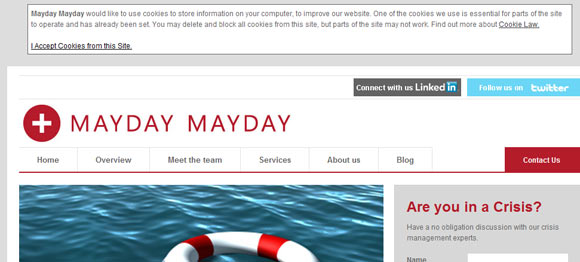Mayday Mayday launched last week: I saw the tweet and followed the link to the corporate website.
Mayday Mayday offer crisis management services, but on this visit I was particularly interested in the home page as seen by a first-time visitor:

Notice how they’ve dealt with the new laws about cookies… Once you’ve allowed the site to add cookies by clicking the link, the message disappears (until you delete your cookies again, or, I suppose, until the cookie expires):

How are you dealing with this new European law on your own site? And have you seen any other good examples of how to deal with this requirement?
The Information Commissioners Office press release explains the changes and offers some guidance on compliance (download the PDF here – and notice that they’ve followed a very similar style to MayDay MayDay).
Although the new rules came into effect from May this year (2011), the Commissioner is allowing a lead-in period of 12 months for organisations to work out how they’re going to meet the requirements. That clock is ticking now…
If you’ve not thought about it yet, do read their advice, and consider the three steps they advise:
1. check what kind of cookies you use
2. assess how intrusive your use is
3. decide how to obtain consent for the use of cookies.
Not all cookies require consent: if your visitor has requested a service (e.g. has put a product in an online shopping basket) then the cookie is necessary to complete the service, and consent is implicit in the service-request.
You might be thinking that this is irrelevant to the corporate site, but in fact there are increasingly different ways in which companies try to personalise the corporate site for the visitor:
- remembering what they’ve already read, to indicate what is new
- what type of content they prefer to see (such as investor, media or jobseeker)
- which language or national site they prefer to visit as a default
- or simply the colours and text-sizes they prefer.
These preferences are all likely to have been stored in a cookie. More than that: if your site displays third-party content, such as video, then that organisation may also need to write their cookies onto ‘your’ visitors’ devices.
Complicated, isn’t it? There may be more detailed guidance issued soon, but in the meantime you should be thinking about what cookies your site uses.
And so should I. Thanks to Mayday Mayday for the reminder!
Lucy is Editor at Corporate Eye